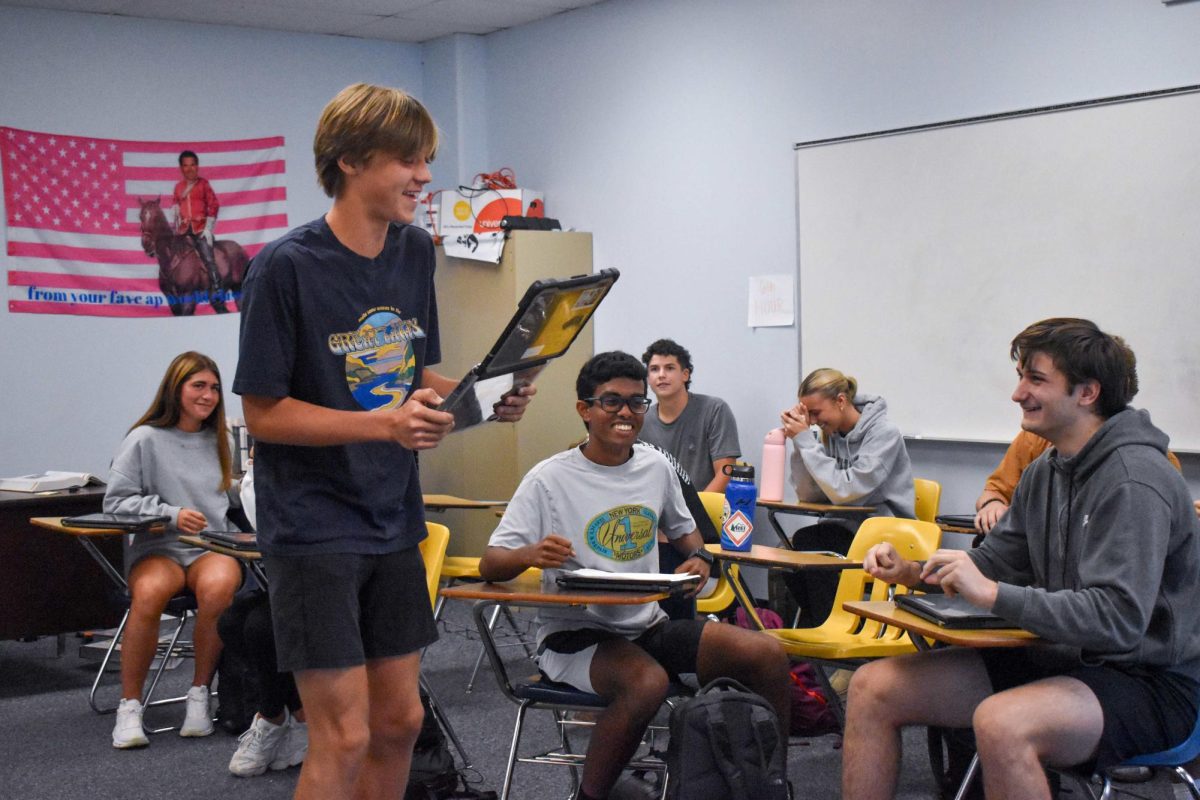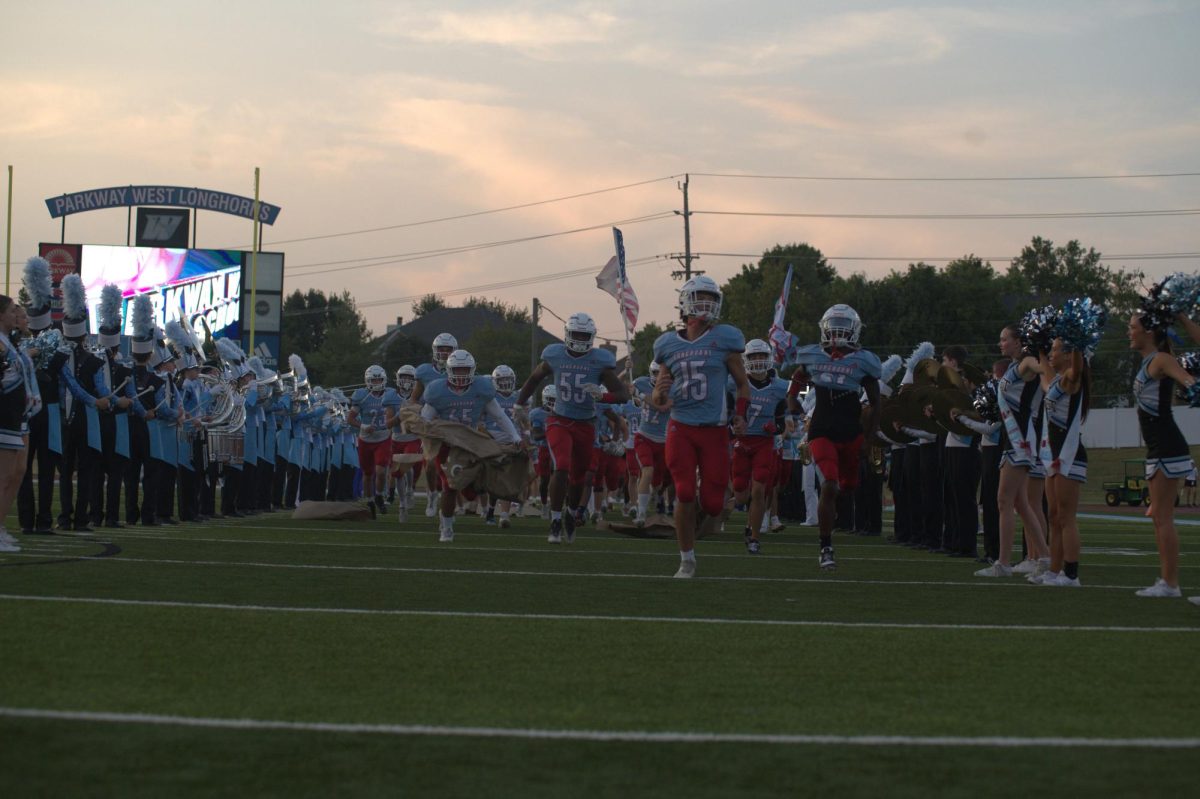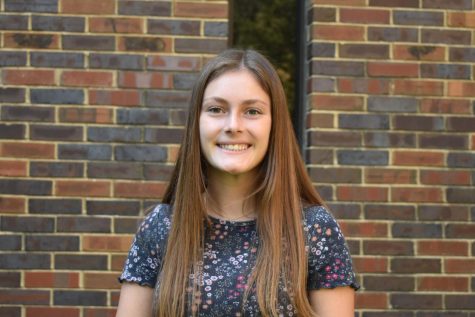American politics have rarely been as contentious as they are today; the mere mention of a political sway can sound alarms for many. However, for some individuals, the restrictions surrounding the discussion of political opinions are heavier. Teachers have always had to refrain from sharing their biases, but in a time of political turmoil, withholding their opinions can become more difficult.┬Ā
Science teacher Paul Hage feels that the longer he has been teaching, the easier it has become to remain unbiased.
ŌĆ£Teachers have opinions about what theyŌĆÖre talking about, [but] our opinions in a lot of cases arenŌĆÖt really supposed to be out there,ŌĆØ Hage said. ŌĆ£ItŌĆÖs a natural human instinct to give your opinion. ItŌĆÖs human nature to want to tell people what you think. After years of teaching, you become used to [remaining unbiased] a little bit.ŌĆØ
Hage teaches Biology and Environmental science classes, both of which cover several topics that have become increasingly politicized in recent years, from mRNA to climate change.
ŌĆ£The point of the class is to teach science and leave it up to the students to figure out how they would deal with it,ŌĆØ Hage said. ŌĆ£IŌĆÖm still trying not to voice opinions that might influence students. One difference this year is we do talk about viruses in Biology, and so I feel worried that I might voice an opinion that has become so charged, and it might offend someone.ŌĆØ
Regardless of the topics he may be teaching, Hage feels that, above all, having an unbiased teacher is important for a studentŌĆÖs development.
ŌĆ£ItŌĆÖs not really my job to exert [my opinion]. If I do have an influence on a student, I donŌĆÖt want to be the person who shapes their narrative. In some cases, if I were to be particularly biased, it would cause a student to alter how they would normally think. There are a lot of students that are forming their identity. I have had teachers that have shown bias, and IŌĆÖve recognized it. So, I try my best not to influence them,ŌĆØ Hage said.
Social studies teacher Jeffery Chazen agrees that remaining unbiased has become more difficult in recent years. Chazen teaches both on-level and Advanced Placement (AP) Government and History of St. Louis and has had to remove several topics from his courses in the past 10 years due to the controversial political climate.┬Ā
ŌĆ£Things are a lot more contentious in our society . Some students and some parents are way more hypersensitive than others. I think Trump has put a giant magnifying glass on things,ŌĆØ Chazen said. ŌĆ£In a way, that’s good, because now more people are paying attention to politics. But if we have more extremist views, I think that can be kind of concerning.ŌĆØ
In his Government class, Chazen covers topics that have certain political beliefs tied to them. Some examples of these topics are liberal and conservative ideologies, religious topics, the right of free speech, criminal rights issues and branches of government.
ŌĆ£I have to bite my tongue a little harder sometimes than others. If I feel like I’m promoting one side more than the other, then I just try to make sure that I say, ŌĆślet’s take a look at it from this view.ŌĆÖ It can be difficult at times, depending on what we’re talking about,ŌĆØ Chazen said.┬Ā
In order to remain unbiased while discussing political topics, Chazen says that he is careful about what he says and plans out lessons and discussions carefully.
ŌĆ£The good thing is that the more active your classes are as far as participating, you don’t have to say very much. All you have to do is kind of referee the sides. What I love about teaching is that there will be times where I don’t say one word, I’m just calling on students. They’re doing the back and forth, which is the ideal situation. It happens more often than people would think. I have to stir the pot a little bit, but a lot of times they do their own talking and sort of going back and forth. All I have to do is really referee this discussion,ŌĆØ Chazen said.
Chazen refuses to share his political beliefs with his class in order to allow them to form their own political identities, which he believes is the goal of the class.┬Ā
ŌĆ£I don’t want [students] to know what I feel, because I don’t want them to either help or hurt their progress in [developing their own political identities]. What I try to do is just push my students to see the other side, so that when they do make up their mind, they’ve had a fair look at everything and then have made their decision,ŌĆØ Chazen said. ŌĆ£I feel like I would hurt that process if I came out and said what I feel because then I feel like I’d be influencing them one way or another. I don’t think that’s my job. I don’t think a teacher should be telling a student how to think or what to think. I think that’s their choice.ŌĆØ
Social Studies teacher Kristen Collins faces similar challenges to both Hage and Chazen while teaching her on-level and AP World History classes, as well as her Challenges to Democracy course. Collins also has opinions about what she teaches, and even covers the topic of point of view in her World History courses. Collins encourages her students to avoid the word ŌĆ£biasŌĆØ in their writings for the class because of the connotations that surround the word.┬Ā
ŌĆ£I have to be real careful about some of the stuff that I teach. I have to think about how I present the topics that I teach,ŌĆØ Collins said. ŌĆ£There’s always been people that have challenged what I’ve taught. [Topics] can be controversial, and it’s okay to have hard conversations.ŌĆØ
Collins has found remaining unbiased has proved more difficult with her Challenges to Democracy course. Collins is the only teacher who teaches this course in the district, meaning that she has the ability to choose the topics that she covers. Despite the fact that Collins is intentional to choose topics that are not too politicized, she says that she still covers many topics with political connotations.┬Ā
ŌĆ£I always tell my students that I’m going to be an equal opportunity criticizer of U.S. foreign policy when we failed. I don’t care who the president was. If it was a Democrat or Republican, we’re going to look at it in terms of what we did and why we did or did not respond,ŌĆØ Collins said.
Collins has taught for 25 years and feels that students should be taught to take part in civilized debates, rather than to avoid controversial issues. However, she feels that in recent years, this has become more difficult due to various political issues.
ŌĆ£I think that we need to teach young people how to have hard conversations [and] how to disagree with each other in a civil fashion, because that’s something that was common when I was a student. We would have very heated debates, but oftentimes, they were some of my best friends that I disagreed with. We didn’t hate each other. We had different perspectives,ŌĆØ Collins said. ŌĆ£As teachers, we fear having hard conversations with our kids. If we don’t model those hard conversations with our students, then how are young people going to learn how to have civil discourse with each other? It’s a double-edged sword, because if I do have those hard conversations that I put myself at risk that I’m going to have parents or students come after me, but then if I don’t, then we don’t learn how to do it.ŌĆØ
As both a mother of her 9-year-old daughter, and as a teacher, Collins tries to remain neutral when discussing politics. She hopes to encourage her child and her students to make their own conclusions and form their own political ideologies.┬Ā
ŌĆ£As a mother, my daughter asks me questions about things that are happening in the world. She asks questions, and I still try to explain to my child both perspectives so that she can come to her own conclusion,ŌĆØ Collins said. ŌĆ£I think it’s important for [students] to draw [their] own conclusions. I want my kids to not just look at things as black and white, but really examine why we do things the way that we do. Trying to look at things from multiple perspectives is really important. I’ve learned over the course of teaching for a really long time that for my kids, it is really important for me to be neutral. I think that’s a good thing to always be absorbing new information and to have the ability to allow your ideology to evolve. Our job needs to be to present the information to our kids and let them make the hard choices.ŌĆØ



![Science teacher Paul Hage points to his Smartboard in the middle of a lecture. Hage feels that topics in the subject that he teaches, specifically in his biology classes, have become increasingly relevant in recent years during the COVID-19 pandemic. ŌĆ£I think that science can be really relevant. Different people might have different opinions [about science],ŌĆØ Hage said.](https://pwestpathfinder.com/wp-content/uploads/2021/12/Behind-the-Bias-1.jpg)

![Freshman Daphne Stokes looks at a table with Veterans Day flyers and information on Nov. 11. Stokes, along with other West High students, like senior Alexander Lewinski, passed by the table in the cafeteria with army recruitment information and giveaways for students to observe during lunch. ŌĆ£Talking with [the recruiters] has definitely helped me [find] where I wanted to go, more than anything else,ŌĆØ Lewinski said.](https://pwestpathfinder.com/wp-content/uploads/2025/11/DSC_1227-2-1200x800.jpg)
![Helping a customer, print room assistant Gretchen Williams operates her booth at the West High Craft Fair from Oct. 25-26. This was WilliamsŌĆÖ first time participating in the Craft Fair with her new craft shop, Gs Beaded Boutique. ŌĆ£People have always said, over the years, ŌĆśyou should open something.ŌĆÖ [I replied that] I would rather just make [my crafts as] gifts for people. I just started [the online store] up, and it's been okay. I'm always surprised [by] how many views I get and [the] people from different states buying things; somebody from Alaska bought something the other day.ŌĆØ](https://pwestpathfinder.com/wp-content/uploads/2025/11/DSC0451-2-1200x799.jpg)
![Gesturing toward the clubŌĆÖs name on the board, Global Youth Aid co-president year Daniah Alsagheer discusses upcoming service projects with members during a meeting on Oct. 30. ŌĆ£We might be one club at one school, but together, weŌĆÖre [part of] something much bigger,ŌĆØ Alsagheer said.](https://pwestpathfinder.com/wp-content/uploads/2025/11/DSC00949-1200x800.jpg)
![Focused on providing exceptional service, sophomore Darsh Mahapatra carefully cleans the door of a customerŌĆÖs car. Mahapatra has always believed his customers deserve nothing less than the best. ŌĆ£[If] theyŌĆÖre trusting us with their car and our service, then I am convinced that they deserve our 100 percent effort and beyond,ŌĆØ Mahapatra said.](https://pwestpathfinder.com/wp-content/uploads/2025/10/DSC_0018-1200x800.jpg)
![Sophomore Aleix Pi de Cabanyes Navarro (left) finishes up a soccer game while junior Ava Muench (right) warms up for cross country practice. The two came to Parkway West High School as exchange students for the 2025-2026 school year. ŌĆ£The goal for the [exchange] program is to provide opportunities for both Parkway students and our international exchange students to learn about other cultures, build connections and become confident, capable, curious and caring ŌĆö ParkwayŌĆÖs Four CŌĆÖs ŌĆö in the process,ŌĆØ Exchange Program Lead Lauren Farrelly said.](https://pwestpathfinder.com/wp-content/uploads/2025/10/Feature-Photo-1200x800.png)

![Gazing across the stage, sophomore Alexis Monteleone performs in the school theater. The Monteleone familyŌĆÖs band ŌĆ£Monte and the MachineŌĆØ has been releasing music since 2012, but Alexis started her own solo career in 2024 with the release of her first single, Crying Skies. ŌĆ£My whole family is very musical, [and I especially] love writing [songs with them],ŌĆØ Monteleone said.](https://pwestpathfinder.com/wp-content/uploads/2025/09/DSC7463-1200x798.jpg)
![Amid teaching a lesson to her AP Calculus BC class, Kristin Judd jokes alongside her students in their funny remarks. Judd has always enjoyed keeping the mood light in her classroom, along with on the volleyball court. ŌĆ£[I enjoy] that side talk where you see [or] overhear a conversation and chime in, or somebody says something funny,ŌĆØ Judd said.](https://pwestpathfinder.com/wp-content/uploads/2025/09/image-1200x730.jpg)
![Eyeing the ball, junior Ella McNeal poses for her commitment pictures at Clemson University. McNealŌĆÖs commitment comes after months of contact with top Division 1 soccer programs. ŌĆ£ It has taken a lot to get to where I am, but I know that [what] I've already been through is just the beginning, and I can't wait for what is to come,ŌĆØ McNeal said.](https://pwestpathfinder.com/wp-content/uploads/2025/09/IMG_4926-1200x900.jpeg)

![Sophomore Shree Sikkal Kumar serves the ball across the court in a match against Lindbergh. Sikkal Kumar has been a varsity member of the varsity girlsŌĆÖ tennis team for two years, helping her earn the number two rank in Class 2 District 2.ŌĆ£When matches are close, itŌĆÖs easy to get nervous, but I [ground] myself by[staying] confident and ready to play,ŌĆØ Sikkal Kumar said.](https://pwestpathfinder.com/wp-content/uploads/2025/11/DSC2801-1200x798.jpg)
![Dressed up as the varsity girlsŌĆÖ tennis coach Katelyn Arenos, senior Kate Johnson and junior Mireya David hand out candy at West HighŌĆÖs annual trunk or treat event. This year, the trunk or treat was moved inside as a result of adverse weather. ŌĆ£As a senior, I care less about Halloween now. Teachers will bring their kids and families [to WestŌĆÖs Trunk or Treat], but there were fewer [this year] because they just thought it was canceled [due to the] rain. [With] Halloween, I think you care less the older you get,ŌĆØ Johnson said.](https://pwestpathfinder.com/wp-content/uploads/2025/10/DSC00892-1-1200x800.jpg)
![Leaning on the podium, superintendent Melissa Schneider speaks to Parkway journalism students during a press conference. Schneider joined Parkway in July after working in the Thompson School District in Colorado. ŌĆ£My plan [to bond with students] is to get things on my calendar as much as possible. For example, being in [classes] is very special to me. I am trying to be opportunistic [meeting] kids [and] being in [the school] buildings. I have all the sports schedules and the fine arts schedules on my calendar, so that when I'm available, I can get to them,ŌĆØ Schneider said.](https://pwestpathfinder.com/wp-content/uploads/2025/09/IMG_5425-1200x943.jpeg)

![Leaping through the air, senior Tyler Watts celebrates his first goal of the season, which put the Longhorns up 1-0 against the Lafayette Lancers. Watts decided to play soccer for West for his last year of high school and secured a spot on the varsity roster. ŌĆ£[Playing soccer for West] is something I had always dreamed of, but hadnŌĆÖt really had a good opportunity to do until now. ItŌĆÖs [really] fun being out [on the field], and IŌĆÖm glad I decided to join the team. ItŌĆÖs just all about having fun with the boys and enjoying what time we have left together,ŌĆØ Watts said.](https://pwestpathfinder.com/wp-content/uploads/2025/09/DSC_1951-1200x855.jpg)

![Shifting global trade, President Donald TrumpŌĆÖs tariffs are raising concerns about economic stability for the U.S. and other countries alike. ŌĆ£[The tariffs are] going to pose a distinct challenge to the U.S. economy and a challenge to the global economy on the whole because it's going to greatly upset who trades with who and where resources and products are going to come from,ŌĆØ social studies teacher Melvin Trotier said.](https://pwestpathfinder.com/wp-content/uploads/2025/05/MDB_3456-1200x800.jpg)

![Pitching the ball on Apr. 14, senior Henry Wild and his team play against Belleville East. Wild was named scholar athlete of the year by St. Louis Post-Dispatch after maintaining a high cumulative GPA and staying involved with athletics for all of high school. ŌĆ£ItŌĆÖs an amazing honor. I feel very blessed to have the opportunity to represent my school [and] what [it] stands for,ŌĆØ Wild said.](https://pwestpathfinder.com/wp-content/uploads/2025/05/unnamed-6-1200x714.jpg)
